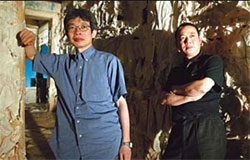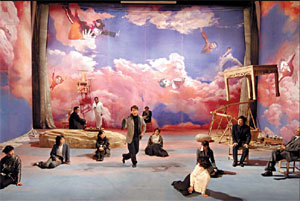| Tools: Save | Print | E-mail | Most Read |
| What Lies Beneath |
| Adjust font size: |
A small village in Sichuan has been famous for hundreds of years for making and selling fake antiques. During the construction of a Japanese-made factory in the village, a real ancient monument attracts scholars, traders, archaeologists and Japanese builders of the factory to the village. They gather in a teahouse and everyone has his own reasons for being there. What historic influence will the discovery bring? Everybody has a view; everybody has a fantasy. What is buried at the site is unknown history. It holds much hope and appears to change the future. It is the powerful theme of an interesting new production. "I hope our play can depict the real relationship between Chinese and Japanese people," said Japanese playwright/director Oriza Hirata. "Both Chinese and Japanese peoples have complicated feelings towards each other. Not all Chinese like Japan, and not all Chinese are anti-Japan. It's the same for the Japanese. I believe a nation will only be healthy when there is different thinking among the people." Dubbed as a "historical allegory", Lost Village (Xiazhou Cun) is done by two playwrights/directors, Li Liuyi from China and Oriza and co-performed by the National Theatre Company of China and the New National Theater of Japan. The play presents an artistic exploration of the two nations' relations. After six performances at the Hong Kong Arts Festival last week, the play will now be performed at the China Children's Art Theater in Beijing next week, and at the New National Theater in Tokyo in May.
"The history of the Chinese and the Japanese may make you instantly think of the conflicts between the two nations and the Japanese invasion, but as artists we felt that we should pursue the question: 'what does history mean to us, as people of the 21st century'?" said 45-year-old Hirata. Hirata and Li spent a year developing their ideas into a script. They met in December 2005 to discuss the structure and plot of the play for the first time, and then exchanged ideas through e-mails for half a year. Hirata wrote the first version. Li rewrote it into a second version and then Hirata came up with the third version, which was again revised in the process of rehearsals. It was a perfect collaboration with Hirata focused more on the script and Li on direction. The result is a play performed by seven Chinese and six Japanese actors and actresses, spoken partly in Chinese and partly in Japanese. "Language is not a problem for us in rehearsals," said Guo Jinglin, who played the role of antique dealer Sanye. "After all, we are players. We could communicate through not only verbal but also physical language, like eye expressions and gestures." For Hirata, using other languages in his work is not something unusual. His play Citizens of Seoul adopted Korean language, while part of another of his works Song of Goodbye were in French. "Theater is about communication, and it is especially so when there is more than one language involved," said Hirata. On the stage, water runs continuously from a bamboo pipe recreating the atmosphere of Southwest China's Sichuan Province, where the story is set and where Li is originally from. However, the acting, lighting and composer Guo Wenjing's music transfers the play from reality into a virtual world. As the characters flock to the village, their motives for being there unfold. Antique dealer Sanye's life goal is to make as much money as possible and achieve prominent social status. The dumped manager of the teahouse, Lihua, is looking forward to her husband's return and a peaceful life. Weizi wants to become a policeman, as keeping public order and being in authority are his dream. The amateur archaeologist has no desires. His fantasy about the historic monument is beyond material; an alternative civilization in this great universe. For Mr and Mrs Sakurada from Japan, they hope they will find their daughter here, as well as long-forgotten affection Apart from discussing China-Japan relations, Hirata also develops his "contemporary colloquial theater theory", a theory he started more than 20 years ago that had a great influence on Japanese theater. "For Japanese as well as Chinese, modern drama is an import from the West, and since the language is different, we have to localize the language to make modern dramas closer to our lives," he said. "We should study our traditional theater, but not copy them." For Li, China-Japan relations were not the only issue he wanted to discuss in Lost Village. Several years ago, Li visited Jinsha, a site in Chengdu, capital of Sichuan Province where many cultural relics of over 3,000 years ago were unearthed. When Li looked at a sculpture of a half-man, half-beast, he realized that people from more than 3,000 years ago were probably more imaginative than today's. "I have always been interested in the relationship between history and current day reality," said Li. "Looking at the splendid civilization of our ancestors created thousands of years ago and our situation now, I feel something is being lost." In the program notes, Li writes "when our reality becomes history, stage becomes our shared experiences. This seems to me to be a fact of life part of experience and unalterable. And yet we don't know what will happen next. We can only wait and let life take its course, and then either respond or not." (China Daily March 27, 2007) |
| Tools: Save | Print | E-mail | Most Read |
 |
| Related Stories |
|

